6 common mistakes in drinking fruit juice
Can drinking fruit juice replace eating fruits?
To answer this question, we should known the production process of fruit juice. After juice extraction, the fruit pectin need to be dissolved by enzymes to lower the viscosity and improve the uniformity of the fruit juice. After that, it will filter out the solid pulps and slag so that it meet the requirement for heating and sterilization. In these processes, many vitamins and dietary fibers have lost, so the nutritional value of fruit juice is lower than fruits.
The bottled fruit juice contains only 1-2% of the fruit fibers. So eating fruits is healthier than drinking fruit juice. Although some fruit juice contains fruit pulps. Their contents are lower than the whole fruits.
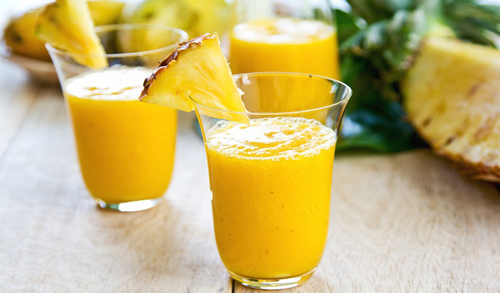
fruit nectar (fruit juice with pulps)
Will drinking fruit juice make you fat?
A cup of 240ml apple juice usually contain 117 Kilocalories. The same quantity of grape juice contains 154 Kilocalories. Drinking too much fruit juice will certainly make you fat. Some diets advocate eating fruits as meals, but they also have sugar and calorie problems.
In 2013, Harvard School of Public Health warned that eating fruits too much will increase the risk of diabetes. Fruits contains rich dietary fibers and vitamin C. Drinking suitable quantity of fruit juice benefits your health, but you must strike a balance. Drinking too much fruit juice will cause excessive intake of sugar, and affect the intake of protein in daily diet, so as to induce muscle loss and gaining weight.
There is no food that cause obesity alone, but even the most healthy food would do harm if you eat them too much.
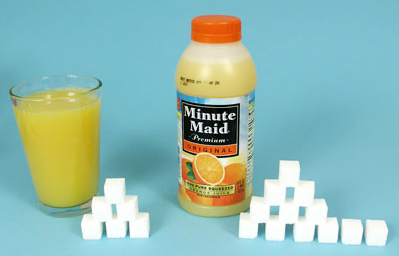 Sugar content in orange juice
Sugar content in orange juice
How much pure fruit juice does your juice drinks contain?
Generally, fruit juice contains rich nutrition, but whether you can take in dietary fiber, vitamin, or minerals depends on which type of juice you drink.
There are various types of fruit juice in the market. You can distinguish them from the ingredients labeled on the bottle. Such as 100% juice, concentrated juice, reconstituted juice, and NFC juice. Some juice drinks only contains 10% pure fruit juice, some contains no fruit juice.
What are their differences? 100% fruit juice can be pure fruit juice, or concentrated juice reconstituted by adding water, sometimes with some vitamins to make for the nutrition loss. For people who care about the sugar content, 100% juice is a better choice, whose sugar content comes from the fruits themselves.
When choosing juice drinks, pay attention to the pure fruit juice content on the bottle. The lower the pure fruit juice content, the less nutritive value, the more additional sugar.
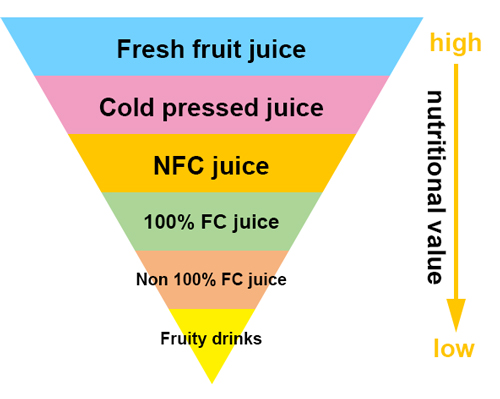
Nutritive value of different fruit juice
Can drinking fresh fruit juice relieve cold?
As we know, vitamin C in fruit juice can prevent scurvy, accelerate wound healing, and improve immunity. Some researches proved fruit juice can reduce the risk of metabolic syndrome. But can fresh fruit juice cure or relieve common cold?
The idea that vitamin C can prevent colds began in 1970, published by Nobel Prize winner Linus Pauling in his book Vitamin C and the Common Cold. According to his opinion, taking in large quantity of vitamin C can reduce the morbidity of cold. He propose to take in 3g of vitamin C every day, much higher than the recommended dietary allowance of 0.1g. At that time, no other researches support or oppose this opinion.
For a long time, many researchers want to reveal the truth. In 2007, Harri Hemila in University of Helsinki published a research analyzing the cold morbidity and vitamin C. This research involved more than 10000 people, which find that taking in 200mg or more vitamin C take no effect on reducing cold morbidity. Some researches proved vitamin C can reduce about 8% the course of disease, but it doesn’t take effects when used after symptom. According to current researches, a cup of 240ml fresh orange juice usually contains over 100mg vitamin C, but even if you drink 2 cups a day, they cannot prevent or cure cold.
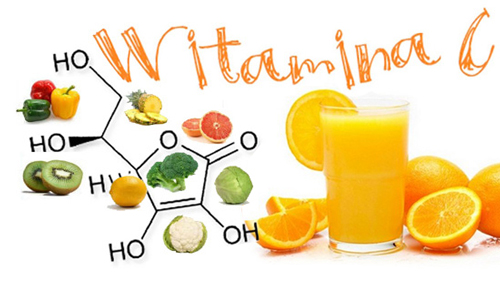
Does fruit juice have detoxifying effect?
The belief that drinking fruit juice to replace 3 meals can activate cells, expel toxin and lose weight is doubtful. A normal person don’t have toxin in his body, and juice diet can’t purify your body. Drinking fruit juice and yogurt contributes to defecation, and drinking water can help expel soluble harmful substances. As for fat-soluble harmful substances like dioxin, they are hard to expel by a diet.
Fruit and vegetable juice mainly contain water, sugar, vitamin, a little dietary fibers, and Phytochemicals like beta carotene, polyphenols, etc. Drinking fruit juice as meal will make you hungry in short term, and cause malnutrition in long term, rather than keep you fit. Even if you can loose weight due to malnutrition, it has nothing to do with detoxifying. To keep fit, a balanced diet and more exercise are more helpful.
Are juice drinks healthier than sugary drinks or sodas?
Most people believe fruit juice is healthier than sodas and other sugary drinks because of less sugar content. But even 100% fruit juice and fresh juice also contain high quantity of sugar. A cup of 240ml orange juice contain 112 Kilocalories, higher than that of a sugary soda (about 94 Kcal). So drinking too much fruit juice will make you fat.
In 2016 Journal of Nutrition, a Spanish team carried out a research. They asked 1868 middle aged and elderly people to drink sugary drinks, sugar free drinks, fresh juice, and bottled drinks. It found that drinking less than 200ml sugary drinks a week won’t increase the risk of having metabolic syndrome. Drinking fresh fruit juice under 200ml can reduce this risk. However, warned by researchers, all these drinks would increase the risk of metabolic syndrome if drank over 200ml every week.
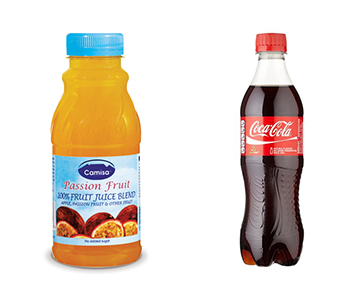
Fruit juice and soda drink
In conclusion, drinking a small amount of sugary drinks won’t do harm to our body, and drinking fruit juice is beneficial. But we must drink in suitable volume.
Get in Touch Now!

 fruit nectar (fruit juice with pulps)
fruit nectar (fruit juice with pulps)

 Nutritive value of different fruit juice
Nutritive value of different fruit juice

 Fruit juice and soda drink
Fruit juice and soda drink



